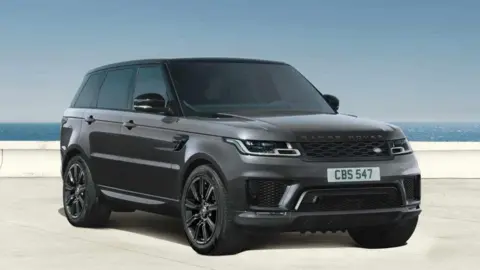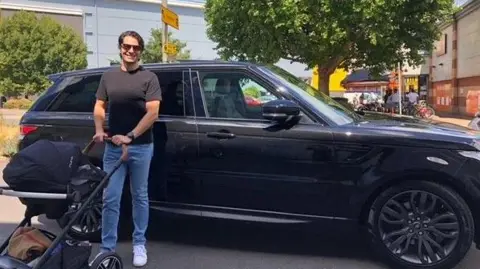By Theo Leggett, Business correspondent, BBC News
 JLR
JLRJaguar Land Rover says it plans to invest more than £1m to help the police fight vehicle crime in the UK.
The money will be used to support police operations in theft hotspots, as well as to fund intelligence gathering.
Earlier this year, the company’s boss angrily denied reports that Range Rovers were particularly vulnerable to theft.
However, owners have complained that insurers have been hiking their premiums dramatically, or even refusing cover.
Among them is Meryl Cabellos, a 41-year-old Frenchman who has lived in the UK for seven years, and works in the technology industry.
Last year, the cost of insuring his 2017 Range Rover Sport doubled, from £2,000 to £4,000.
He then discovered that his insurer would not be able to renew his cover at all this year – and struggled to find a replacement.
 Meryl Cabellos
Meryl CabellosFaced with a best quote of £10,000, and with the car itself losing value rapidly, he decided to cut his losses and sell it.
“We’ve been Range Rover customers for many years, and it really feels as though we’re being priced out now,” he said.
“We’re just really disappointed. We loved the car but because of the insurance the experience of owning it went downhill so quick.”
Insurance costs can vary considerably, with factors such as the driver’s record and experience, as well as where the car is kept and the security features it contains all taken into account.
Expensive, luxury cars are often targeted by thieves, because they can be sold abroad at a big profit. That, in turn, can push up premiums.
For Jaguar Land Rover, this has become a problem. The company builds a range of premium models, with the Range Rover brand a particular favourite for celebrities, politicians and even royalty.
That kind of prestige comes at a cost. The Range Rover starts at £104,000 while its smaller sibling, the Range Rover Sport, is on sale from £75,000. But embarrassingly for the company, it also has a reputation for being vulnerable to theft.
Earlier this year, JLR’s chief executive Adrian Mardell condemned reports that suggested the Range Rover was Britain’s “most stolen vehicle”.
He admitted that vehicle theft by organised criminals was a serious issue in the UK, but insisted his own business had been unfairly singled out, and that strenuous efforts had been made to improve vehicle security.
He accused the insurance industry of failing to take account of all the available information when setting premiums.
The police funding is the latest in a series of moves designed to reassure consumers and attempt to bring down insurance costs.
Last year, for example, the company set up its own insurance products in an effort to help customers who were unable to obtain cover, though some Range Rover owners claim they have still been unable to obtain quotes.
New national policing unit
The new money, JLR says, will be used to support several police forces “with additional dedicated resources to respond to vehicle thefts across the country”.
It will also help pay for a new national policing unit to gather intelligence on vehicle thefts, and increased police activity at the ports used by criminal gangs to ship cars abroad.
The company says it is already sharing information with the police to help them find and recover vehicles, and has provided training to some 650 officers.
At the same time, it says it has been working hard to make its vehicles less vulnerable to theft.
It cites data from the Police National Computer showing that since January 2022 only 0.2% of new Range Rovers and Range Rover Sports have been stolen.

